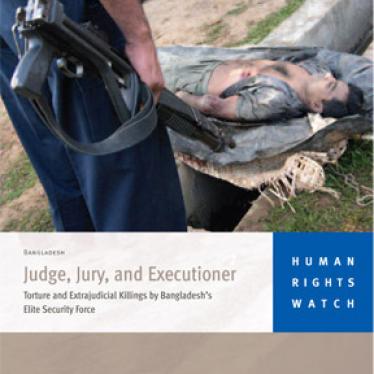(New York) - The government of Bangladesh should allow a photo exhibit about extrajudicial executions in Dhaka to go ahead as planned, Human Rights Watch said today. Barring the exhibit from opening was a serious violation of freedom of expression, Human Rights Watch said. There have been hundreds of such killings in Bangladesh.
The police in Dhaka closed down the Drik Picture Library on March 22, 2010, shortly before the exhibit was to open. The exhibit, "Crossfire," by Shahidul Alam, features photographs and installations relating to alleged extrajudicial killings by the Rapid Action Battalion (RAB), a military-dominated crime-fighting force. Officers often contend that these are "crossfire" killings, in which they killed an alleged criminal in self defense, often to prevent an escape.
"The government should address RAB's involvement in extrajudicial executions instead of trying to silence those who are promoting public debate about the problem," said Brad Adams, Asia director at Human Rights Watch. "These killings can't just be airbrushed from reality."
Since the exhibit was closed, police officers have been stationed outside Drik, preventing the public from visiting the exhibit. The reason given by the Rapid Action Battalion and the police for closing down the exhibit, which had received international attention, was that it "lacked official permission" and would "create anarchy." Shahidul Alam, who is managing director of Drik, told the news media, however, that Drik had organized thousands of exhibitions in the past, including some at which the present and former prime ministers attended the opening, without any requirement from the authorities for explicit permission to hold the exhibit.
Since the battalion was established in mid-2004, it has killed more than 500 people. As far as Human Rights Watch has been able to establish, no one has been prosecuted for any of these killings.
In December 2006, Human Rights Watch released the report, "Judge, Jury, and Executioner," which documented that many of the victims of "crossfire" killings in a large number of cases reviewed had instead either been tortured to death or summarily shot. The report recommended that the battalion be fundamentally reformed or abolished.
The current government was elected on a platform that it would put an end to extrajudicial executions by security forces. However, according to its own statistics, 111 persons were killed by law enforcement officials in 2009 alone.
In recent months, the minister of home affairs, to whose ministry the battalion formally reports, has claimed that there have been no extrajudicial killings under the current government and that law enforcement officials have only fired their guns when attacked by criminals. However, investigations by human rights workers have found that the victims in many cases have been summarily shot and killed.
"The government was elected on promises of stopping extrajudicial killings and of upholding free expression," Adams said. "Now that they are in power, they are singing a different tune. The prime minister should instruct officials not only to allow this exhibit to open, but to file criminal cases against RAB officers who act as judge, jury, and executioner."







